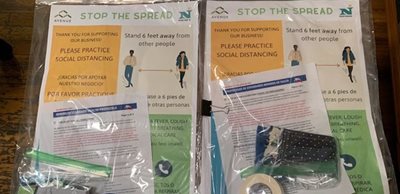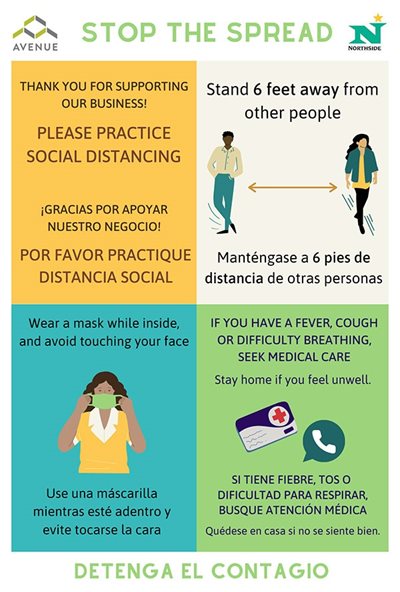At Avenue CDC in Houston, Texas, as in other places across the United states, everything changed overnight. As COVID-19 spread, employees went from working in an office to working at home, from building strong homes and communities to feeding those communities, too.
"Things were pretty dire," says Maria Aguirre-Borrero, director of community initiatives. "There was barely time to talk." Though they weren't a relief organization, residents needed resources. The organization began to focus on food, diapers, formula and disinfectant. Grants from Rental Resilience and Critical Relief funds made possible by a collaboration between NeighborWorks America and the Wells Fargo Foundation, helped make Avenue's quick response possible. Early on in the COVID-19 pandemic, the two organizations came together to explore ways to provide much-needed resources for organizations trying to respond to unprecedented community needs and keep business operations intact.
Mary Lawler, executive director, explains, "Safe, stable and affordable housing is the primary source of security during this uncertain time." Lawler says that the the rental resilience funding they received, because of the support the Wells Fargo Foundation provided, helped them to manage any threats to their portfolio as a result of the pandemic and ensure the safety of residents. "At the same time, this funding helped provide the technology to allow our staff to work from home and created a seamless transition for providing services to help Houstonians access resources. We are proud to be a part of the NeighborWorks network and grateful for this funding that makes it possible to provide valuable support to our communities," she says.
Aguirre-Borrero says that as crisis was hitting, the Houston Chronicle ran a story listing the Northline neighborhood, where Avenue has focused some of their revitalization efforts, as likely to be among the hardest hit. To prevent that, the NeighborWorks organization joined other organizations in making plans to reach out to residents. "We started with the elderly," she says. "Three hundred eighty whole chickens. Three hundred eighty loaves of bread."
 Darla Berry, senior director of fund development for Avenue, says many of their residents worked in the service industry or as domestic workers. But restaurants closed, and domestic workers lost their jobs. Some of the women began making masks to make up for lost income, and Avenue used some of their critical relief funding to contract with them for 2,000 handmade masks. They passed the masks out to residents and packed 10 each into business safety kits.
Darla Berry, senior director of fund development for Avenue, says many of their residents worked in the service industry or as domestic workers. But restaurants closed, and domestic workers lost their jobs. Some of the women began making masks to make up for lost income, and Avenue used some of their critical relief funding to contract with them for 2,000 handmade masks. They passed the masks out to residents and packed 10 each into business safety kits.
Meanwhile, Avenue is providing meals for children at their multifamily properties, she says. And when school began – online – they hired teachers to work in community rooms to provide direct learning support for students. Since mid-March, about 2,000 meals per month have been provided to children up to 17 years old.
"It's kind of like after Harvey," Berry says, speaking of the category 4 hurricane that tore through Texas in 2017. "Everyone had to pivot immediately and provide more direct care resources to the residents that we serve." After Harvey it was rehousing people and providing home repair. "Our homebuyer education shifted to providing Houstonians—especially those in our target neighborhoods—with Harvey resources and support."
This time, Berry says, staff pivoted to accessing resources and providing them. They pivoted to clearing up misinformation, sharing information in English and in Spanish. "Some of the residents we serve are undocumented, and there's an understandable level of mistrust of accessing resources," she adds.
Testing was slow to reach Houston, Aguirre-Borrero says, and at first, the virus seemed far away "It wasn't until way later, when they opened sites in the neighborhood seeing actual confirmed cases. It started feeling closer. A friend of a friend. Then the mom of a friend. Then one of our community members. It was a slow wave." The silver lining was that Northline wasn't one of the hardest hit neighborhoods, she says. "But it was hit."
Another bright spot? "You could feel everybody banding together and reacting."
"We wanted to serve the residents who live in our properties as well as residents who live in the communities we serve," Berry says "We stepped up our case management at our rental properties. Food, medical supplies. We were looking out for them."
Some of the programming was around disaster preparedness, Berry says, "since we were approaching hurricane season."
"The funding from NeighborWorks and Wells Fargo has enabled us to safely work from home, to push the information out to clients through numerous different ways." Facebook Live has been a great way to connect with community residents. The Community Initiatives team has held hundreds of events on topics ranging from accessing COVID resources to disaster preparedness to Census participation, achieving more than 40,000 views. "We've presented puppet shows for kids. We've distributed tablets for kids with no access to technology. There's no way we could have provided all of that without the funding assistance."
Meanwhile, she says, regular services didn't pause. "Foreclosure counseling went to online and we added a staff person to assist." They had been expecting more demand for foreclosure prevention assistance, she says, but many of the calls they received—and are still receiving—are clients needing help navigating the forbearance process. "In addition to the rental resilience funding, we also received two generous grants from the Greater Houston Community Foundation, allowing us to serve approximately 2,000 families with direct financial assistance, including rental or mortgage assistance, including 49 households living in Avenue multi-family properties," Berry says.
The dust has settled a little, says Aguirre-Borrero. "But the need is still incredibly high. We're moving on from emergency relief into the long-term effects of what COVID did to these properties and these neighborhoods. Desperation is the new reality. We're trying to figure out what resources are still out there."
10/14/2020

